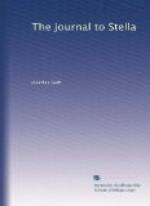11 See Letter 7, note 17.
12 Sir Richard Cox, Bart. (1650-1733), was Lord Chancellor of Ireland from 1703 to 1707. In 1711 he was appointed Chief-Justice of the Queen’s Bench, but he was removed from office on the death of Queen Anne. His zealous Protestantism sometimes caused his views to be warped, but he was honest and well-principled.
13 Sir Thomas Hanmer, Bart. (1676-1746), succeeded Bromley as Speaker in 1714. In February 1713 Swift said, “He is the most considerable man in the House of Commons.” His edition of Shakespeare was published by the University of Oxford in 1743-44. Pope called it “pompous,” and sneered at Hanmer’s “superior air” (Dunciad, iv. 105).
14 See Letter 5, note 8.
15 Elliot was keeper of the St. James’s Coffee-house (see Letter 1).
16 Forster suggested that the true reading is “writhing.” If so, it is not necessary to suppose that Lady Giffard was the cause of it. Perhaps it is the word “tiger” that is corrupt.
17 The Hon. Charles Boyle (1676-1731), of the Boyle and Bentley controversy, succeeded to the peerage as Lord Orrery in 1703. When he settled in London he became the centre of a Christ Church set, a strong adherent of Harley’s party, and a member of Swift’s “club.” His son John, fifth Earl of Orrery, published Remarks on the Life and Writings of Jonathan Swift in 1751.
18 William Domville, a landed proprietor in County Dublin, whom Swift called “perfectly as fine a gentleman as I know.”
19 On May 16, 1711, Swift wrote, “There will be an old to do.” The word is found in Elizabethan writers in the sense of “more than enough.” Cf. Macbeth, ii. 3: “If a man were porter of hell gate, he should have old turning the key.”
20 See Letter 3, note 10. Clements was related to Pratt, the Deputy Vice-Treasurer, and was probably the Robert Clements who became Deputy Vice-Treasurer, and whose grandson Robert was created Earl of Leitrim in 1795.
21 Letter 5, note 11.
22 Swift’s sister Jane, who had married a currier in Bride Street, named Joseph Fenton, a match to which Swift strongly objected. Deane Swift says that Swift never saw his sister again after the marriage; he had offered her 500 pounds if she would show a “proper disdain” of Fenton. On her husband’s dying bankrupt, however, Swift paid her an annuity until 1738, when she died in the same lodging with Esther Johnson’s mother, Mrs. Bridget Mose, at Farnham (Forster’s Swift, pp. 118-19).
23 Welbore Ellis, appointed Bishop of Kildare in 1705. He was translated to Meath in 1731, and died three years later.
24 The expression of the Archbishop is, “I am not to conceal from you that some expressed a little jealously, that you would not be acceptable to the present courtiers; intimating that you were under the reputation of being a favourite of the late party in power” (King to Swift, Nov. 2, 1710).




